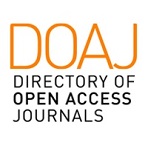The deviations of algorithms in everyday use
DOI:
https://doi.org/10.29147/datjournal.v8i3.761Keywords:
Algorithms, Artificial intelligence, Machine translation, SciArt installationAbstract
In our daily lives we live with rapid audio and image responses that are inaccurate, incorrect, imperfect and unreliable. Here we look at the situations that operate in contemporary unpredictability with the biases given to automated translations by Artificial Intelligence, especially with regard to gender. This discussion results in the work “Sesgos y traducción automática” (2023), an artistic project developed by artists Helena Hernández Acuaviva and Agda Carvalho, which is part of the ASTER Research Project (University of Seville). Its aim is to show the gender biases that exist in automatic translations and image and sound manipulation. This reflection focuses on the interference of algorithms in our daily decisions, since they inhabit the networks and help us access diverse information.
Downloads
References
ALON-BARKAT, S, BUSUIOC, M. Human–AI Interactions in Public Sector Decision Making: “Automation Bias” and “Selective Adherence” to Algorithmic Advice. Journal of Public Administration Research and Theory, nº 33, p. 153–169, 2023. (https://doi.org/10.1093/jo- part/muac007) DOI: https://doi.org/10.1093/jopart/muac007
ALONSO, C. Que Google y Microsoft eliminen el sesgo de género en los traductores Inglés/ Español. In: Change.org, 2021. (https://www.change.org/p/microsoft-que-google-y-micro- soft-eliminen-el-sesgo-de-g%C3%A9nero-en-los-traductores-ingl%C3%A9s-espa%C3%B1ol)
BLOCK, K. La traducción con Inteligencia Artificial: el futuro aún presenta sesgo de gé- nero. In: Think Big Telefónica, 2020. (https://blogthinkbig.com/sesgo-de-genero-traduc- cion-ia/n)
CERTEAU, M. A invenção do cotidiano – artes do fazer. Rio de Janeiro: Vozes, 2013. DATABRICKS. Automation Bias. Databriks All, 2023.
EUROPEAN COMMISSION. HUMAINT: Human behaviour and machine intelligence. In: AI Watch HUMAINT, 2023. (https://ai-watch.ec.europa.eu/humaint_en)
PROYECTO DE INVESTIGACIÓN ASTER. Catálogo exposición ASTER > ARTE ^ CIENCIA. In:
Aster, 2023. (https://aster.us.es/wp-content/uploads/2023/08/CATALOGO-ASTER-APARE- JADORES.pdf)
MALDONADO, C. E. La complejidad humana consiste en un entramado de tiempos. Cinta De Moebio. Revista De Epistemología De Ciencias Sociales, nº 73, p. 14–23, mar. 2022. (ht- tps://cintademoebio.uchile.cl/index.php/CDM/article/view/66683) DOI: https://doi.org/10.4067/s0717-554x2022000100014
SADIN, E. La inteligencia artificial o el desafío del siglo: anatomía de un antihumanismo
radical. Ciudad Autónoma de Buenos Aires: Caja Negra, 2020.
SARAMAGO, L. A topologia do ser: lugar, espaço e linguagem no pensamento de Martin Heidegger. São Paulo: Loyola, 2008.
UN INFORMÁTICO EN EL LADO DEL MAL. La gestión del sesgo de género en los traductores de Microsoft y Google: Los responsables nacionales y los Cloud Solutions Architect (CSA) son hombres. In: BLOG PERSONAL DE CHEMA ALONSO SOBRE SUS COSAS, 2020. (https://
www.elladodelmal.com/2020/12/la-gestion-del-sesgo-de-genero-en-los.html).
Downloads
Published
How to Cite
Issue
Section
License
Copyright (c) 2023 DAT Journal

This work is licensed under a Creative Commons Attribution 4.0 International License.


























